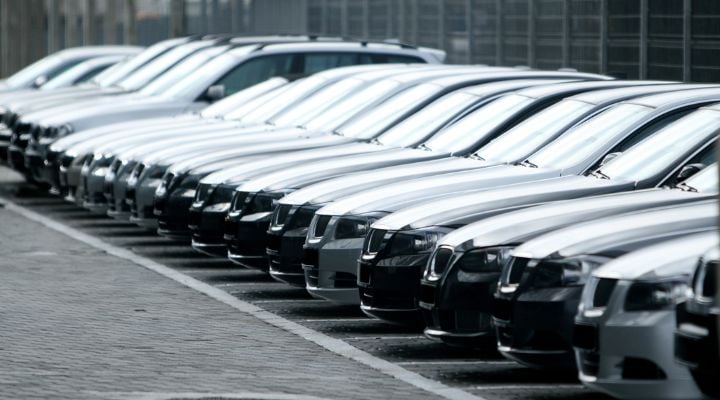Company Cars vs Mobility Packages
Drivers from across the globe are under constant pressure to reduce their over-reliance on fossil fuel-driven cars, so what explanation is there for the recent increase in the numbers of company-owned vehicles on many of Europe’s roads, particularly with so many other mobility options available?

Anyone that grew up in the 1970s or 80s (or at least remembers those now-distant decades) will recall how the notion of the company car was something of a suburban status symbol. If either of your parents were afforded the luxury of driving a gleaming Ford Cortina or Opel Ascona that was automatically replaced and renewed every couple of years (even though they didn’t own it) it was seen as an aspirational benefit, a perk of mum or dad’s executive status.
During the last few years, a time when the increase in private car ownership has steadied, if not slowed, a notable trend has emerged among major European companies as they reevaluate traditional employee benefits. The conventional practice of providing company cars, and there are currently in the region of 10m in Europe, is undergoing a transformation, with a growing number of businesses opting for innovative ‘mobility packages’, taking into account changing employee preferences, environmental concerns, and the evolving landscape of transport options, including Mobility as a Service. However, how much of a true transformation can this be if across the continent the numbers of company-owned vehicles is slowly increasing?
The conventional practice of providing company cars, and there are currently in the region of 10m in Europe, is undergoing a transformation, with a growing number of businesses opting for innovative mobility packages
Some would say that the idea of major corporations thinking outside the company car box is not before time – by way of an example, as of 2022, 53.2% of all new vehicles registered in the UK (where the most popular company car is the Nissan Qashqai) had a company keeper. However, it could be argued that the UK is perhaps not the best litmus test as British people, broadly speaking, tend to have a far greater appetite to own things (this is true of houses as much as it is of cars) than their mainland European counterparts.

MAAS APPEAL
The notion of MaaS for Business deserves an article of its own as there are certainly conversations to be had around connected services and connected fleets, with several major fleet and leasing companies (not to mention software giants) fully behind the concept of providing employees with alternative modes of transport, but a 2023 survey by Willis Towers Watson revealed that the majority of businesses were not considering alternatives to vehicles.
The notion of MaaS for Business deserves an article of its own as there are certainly conversations to be had around connected services and connected fleets
So this begs the question: what is the real picture? Car-sharing and car clubs are certainly have ‘skin in the game’, particularly companies such as Wagonex and MyCarDirect, who offer short-term subscriptions and the ability to upgrade or downgrade easily. This concept still centres on the use of cars, but not the typical and historical fixed 3-4 year lease deals, thereby leaving the use of alternative transport options on the table. On a smaller scale for fleets, the ‘cycle to work’ push has led to a notable increase in the numbers of people travelling on two wheels in countries not typically given to active forms of travel, but it’s not a practical alternative for many fleets, and neither is the likes of the Citroen Ami (technically a quadricycle) which has a very limited range range and a top speed of just 45km/h. Talk of the Ami as a potential fleet vehicle has been met with derision by the fleet media.
Who, then, is leading the way in alternatives to company cars?
One of the pioneering companies leading this transition is Siemens, who in 2021 announced that it was phasing out company cars in favour of comprehensive mobility packages for its employees. Siemens recognised that the traditional model of company cars was no longer aligned with its increasingly diverse workforce’s commuting needs and sustainability goals.
Siemens' mobility packages include a mix of public transport subsidies, ride-sharing credits, and flexible working arrangements, catering to the varied preferences of employees but also aligning with the company's commitment to reducing its global carbon footprint. By encouraging the use of public transport and shared mobility services, Siemens has stated that its aim is to contribute to a more sustainable and eco-friendly future.

Siemens' mobility packages include a mix of public transport subsidies, ride-sharing credits, and flexible working arrangements
Another ‘trailblazer’ in this sphere is the British-Dutch multinational consumer goods company, Unilever, home to over 400 household name brands such as Magnum ice creams and Dove skin care, has strategically moved away from the conventional practice of offering company cars in favour of introducing mobility allowances. This allows its 148,000 employees to choose their preferred mode of transport, whether it be bus, shared bike or even electric scooter.
Unilever's decision reflects a broader recognition of the importance of flexibility in the modern workplace. By providing mobility allowances, the company is empowering its workforce to make choices that align with their individual needs. This not only enhances employee satisfaction but also positions Unilever as a forward-thinking employer attuned to the evolving expectations of the workforce and to that of the notion of working.
In Sweden, Volvo Group has also embraced the shift towards mobility packages. Volvo recognises that the future of transport is dynamic and multifaceted, with employees seeking a variety of commuting options beyond traditional company cars. The company's mobility packages incorporate public transit passes, car-sharing memberships and even e-bike allowances, demonstrating a commitment to sustainable and flexible transport solutions.
The adoption of mobility packages is not limited to specific industries or regions. Companies such as Nestlé, the Swiss multinational food and beverage giant, have also acknowledged the need for a more versatile approach to employee transport benefits. Nestlé's mobility packages encompass a range of options, including subsidised public transit, car-sharing credits and incentives for employees who choose the most environmentally friendly modes of commuting.

A SHIFT TOWARD MOBILITY PACKAGES
This shift towards mobility packages is driven by several factors. Firstly, employees increasingly prioritise flexibility and personalised benefits over traditional, one-size-fits-all perks, and the move towards increased homework was exacerbated by the Covid-19 pandemic. Mobility packages empower individuals to tailor their commuting solutions to fit their lifestyle and values, fostering a more engaged and satisfied workforce that, in turn, seems to be engendering equally productive staff.Secondly, there is a growing awareness of the environmental impact associated with company cars. Many European companies are aligning their policies with sustainability goals, encouraging employees to choose eco-friendly mobility options. This not only supports corporate social responsibility initiatives but also positions companies as leaders in environmental stewardship.
Additionally, the rise of smart mobility solutions and advancements in transport technology have expanded the range of choices available to employees. With the proliferation of ride-sharing, electric scooters, and bike-sharing services, employees have more alternatives than ever before, making the traditional company car less appealing and practical.
Many European companies are aligning their policies with sustainability goals, encouraging employees to choose eco-friendly transportation options
The corporate world’s move away from the culture of company cars to mobility packages, certainly among major European companies, is testament to the evolving nature of employee benefits and corporate responsibility. The likes of Siemens, Unilever, Volvo Group, Nestlé and others are paving the way for a more flexible, sustainable and employee-centric approach to mobility benefits.
As businesses continue to adapt to changing societal trends, the adoption of mobility packages is likely to become more widespread, shaping the future of employee benefits, not to mention reshaping the very nature of working, in the European corporate landscape.





